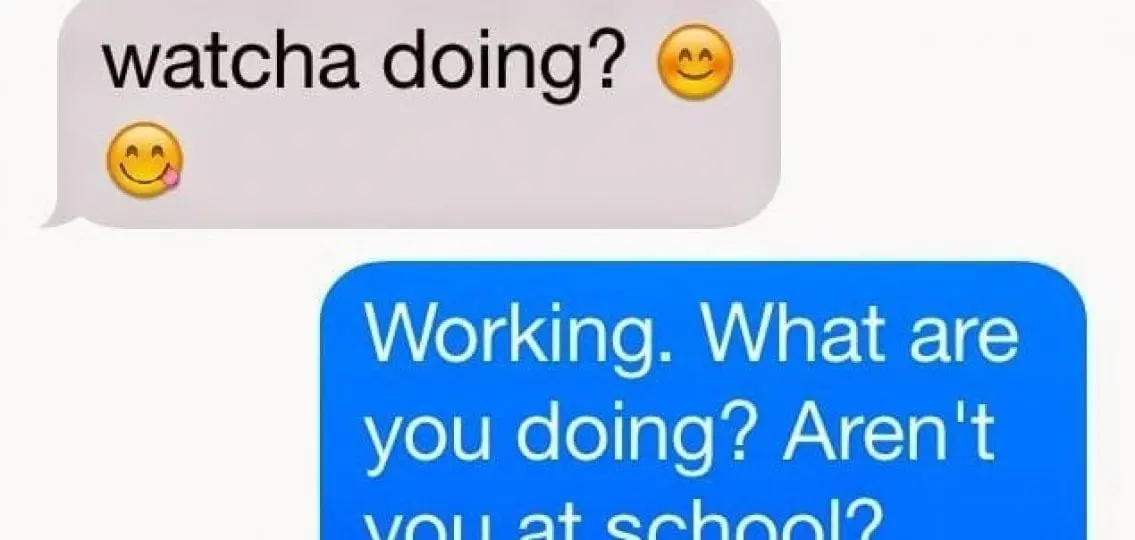What happens when a teen feels one way about a particular issue or problem and the parent has a very different take? At Your Teen, we understand that sometimes you need to look at a problem from multiple perspectives. It can also be helpful to hear from a neutral third party. That’s when we bring in a parenting expert to provide the practical advice you need to bridge the divide and help restore harmony. In this series, we’re talking about those phones. Why don’t our kids text back?

 PARENT | Melissa Fenton
PARENT | Melissa Fenton
Pay phones. Remember them? I sure do.
I remember knowing the exact location of the pay phones in and around my high school as well as the one that stood at the end of the hall in my freshman college dormitory. It’s where I would stop after a late-night high school party and call my mom, letting her know I was on my way home. It’s where every few days at college I would call home “collect” and check in with the parents.
How lucky are we as parents not to have to depend on pay phones to stay in contact with our kids? Well, lucky—you bet.
But also slightly traumatized? Oh my word, YES. Why is that? Because when I call my son, I think that he should answer his phone the second it rings. And that same kid should answer my text like the country’s national security depends on it.
Sadly, I’ve learned none of that actually happens. More often than not, my son ignores my texts.
You see, teens love their cellphones. They just don’t love them attached to the other end of their parents’ cellphones.
For a typical mom like me who worries about the whereabouts of my teens when they’re away from home and on the road, cellphones seem like a lifesaver.
But to the average teenager? They are a massive nuisance. Having been told never to text and drive, my teens keep their phones turned off and in their backpacks on the drive to and from school. This means that when I call and get no answer, my mind instantly goes to images of them crashed into a tree.
“Mom, you said never to use our cellphones while driving, so it’s off. Now which is it? You want to talk to me, or you want me to drive?”
Sometimes they are wise beyond their years. The constant connection, with the expectation that teens be instantly responsive to calls and texts from their parents, is too big a burden for them. I need to constantly remind myself (and my panicked brain) of that.
It makes me almost want to go back to pre-cellphone times—and ironically, my son will agree with me on that!
Melissa Fenton is a freelance writer and adjunct faculty librarian. She is a mother of four sons and writes about modern motherhood and parenting teenagers. Find her at 4boysmother.com.
TEEN | Casey Fenton
I got my first phone a few years ago when I started driving. My parents allowed it for safety reasons. I was excited to finally text and Snapchat with friends. And there were many times when a cellphone was a must-have for staying in contact with bosses, coaches, teachers—and, of course, my parents.
But that’s where the problems started—the contact with my parents.
I’m not as attached to my phone as they think I am.
Meaning: I don’t always respond to texts and phone calls from my mom and dad the second I get them. I don’t even do that with my friends!
I think parents assume we have our phones in our pockets 24/7, like it’s an immediate lifeline and instant connection with them. Honestly, when I don’t answer or text right back, the last thing on my mind is the fact they are now beginning to panic and worry that something happened to me. I’m just going about my day and thinking I will call them later, or tomorrow.
At times, I almost think it’s worse that I have this thing in my pocket always demanding to be answered. (It can happen at the most awkward times. On a date and get a text from your mom? Total buzzkill.)
I know cellphones are a modern necessity, and my phone does help keep my parents calm and assured that I can reach them or some other help if need be. Still, I can’t help but think that whole generations of teenagers and college kids survived without this constant connection. Sometimes I almost wish we could go back to that. I think it would bring my parent’s sanity back—just a little.
Casey Fenton is a sophomore at Florida State University, where he majors in communications/digital media.
EXPERT | Devorah Heitner, Ph.D.
Melissa and Casey’s dilemma may be a familiar one to other families.
All of us are experiencing more connectivity anxiety.
The ubiquity of smartphones means that it is theoretically possible to connect anytime and from anywhere.
This can create new social expectations for contact. If the possibility for constant connection exists, how do we balance that with the need to stay present and focused on our in-person experiences?
How do young people separate from their high school friends and their parents when they leave home to go to college?
In some ways, mobile devices can make it easier to send our kids off into the world, or even out with friends for the evening. As parents, we feel comforted knowing our teenagers can reach us in an emergency. In the case of younger teens, parents may want to require more connectivity (and quick responses) as a matter of safety and supervision.
As kids grow older, though, the approach should evolve. Boundaries and open discussion about communication expectations can help everyone avoid (most) hurt feelings and set realistic expectations.

In this situation, Casey sounds like he is doing an excellent job moving toward independence. If Melissa wants to set up a regular weekly call with him to say hi, at a time that works well for both of them, that might alleviate both of their frustrations.

 PARENT | Melissa Fenton
PARENT | Melissa Fenton




